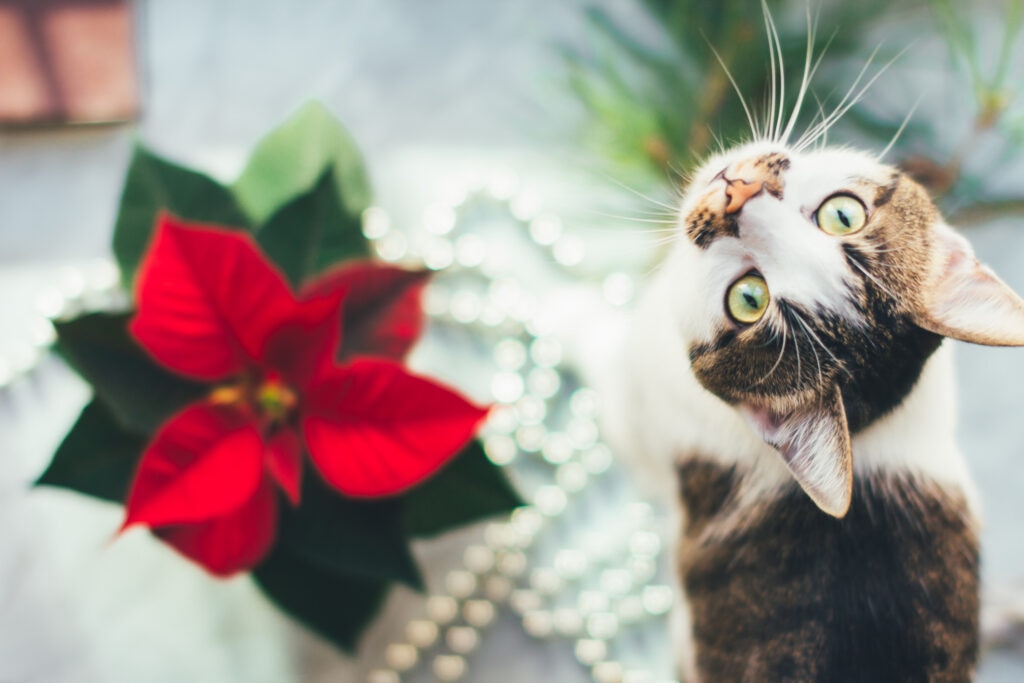Are Poinsettias Poisonous to Cats?

Photo by Anna_Hirna/iStock/Getty Images Plus
Around the holidays, it’s common to find picturesque poinsettias in many pet parents’ homes. And some cats love to sniff and snack on houseplants. So are poinsettias poisonous to cats?
The short answer: Technically, yes. Poinsettias are mildly toxic to cats, and may cause an upset stomach or drooling. It’s rare for poinsettia ingestion to result in any serious symptoms in pets.
We talked with veterinarians to learn more about the risks of poinsettias to cats, what to do if your cat eats the plant, and other poisonous holiday plants to avoid.
Key Takeaways
- Poinsettias are mildly toxic to cats, typically causing only minor symptoms such as vomiting or drooling.
- Most cases of poinsettia poisoning in cats do not require veterinary care and resolve on their own.
- Pet parents should monitor for persistent symptoms and consult a vet if issues last longer than 12–24 hours.
- Several holiday plants are far more toxic to cats and should be avoided entirely.
Are Poinsettias Poisonous to Cats?
While poinsettias are technically poisonous to cats, the severity of their toxicity is mild, says Renee Schmid, DVM, DABT, DABVT, senior veterinary toxicologist and DVM supervisor at Pet Poison Helpline in Bloomington, Minnesota.
That means that ingesting part of a poinsettia is rarely cause for concern. A cat might experience mild stomach upset or lack of appetite that resolves on its own without medical attention.
The sap in poinsettia leaves and stems is the most toxic part of the plant. It contains diterpenoid euphorbol esters and saponins, organic plant compounds that can lead to gastrointestinal distress in cats.
Symptoms of Poinsettia Poisoning in Cats
Dr. Schmid notes that common symptoms of poinsettia poisoning in cats may include:
Some rare complications of poinsettia poisoning may also include dehydration due to continued gastrointestinal upset or skin irritation caused by exposure to the plant, she says.
What to Do If Your Cat Eats a Poinsettia
If your cat likes to graze on greenery, they may try to sneak a nibble on poinsettia leaves or stems. The good news: These vibrant red and green plants pose a low risk and usually result in mild symptoms, if any.
Phil Good, DVM, owner and medical director of Beyond Pets Animal Hospital in Marietta, Georgia, shares these tips on what to do if your cat eats a poinsettia:
- Gently remove any bits of the plant from your cat’s mouth.
- Move the plant out of their reach.
- If your cat cooperates, rinse their mouth with a little water.
- Monitor for symptoms like changes in appetite, energy, or digestion.
Dr. Schmid recommends calling your veterinarian or a 24/7 animal poison helpline if your cat:
- Vomits several times within a few hours
- Continues vomiting throughout the day
- Has more than two or three bouts of diarrhea
When in doubt, it’s always a good idea to consult a veterinary professional if you notice changes in your cat’s behavior or symptoms. The following numbers can be helpful in case of an emergency:
- Pet Poison Helpline: 855-764-7661; a consultation fee applies
- ASPCA Animal Poison Control Center: 888-426-4435; a consultation fee may apply
“I always remind pet parents that while poinsettia reactions are usually mild, every cat responds differently,” Dr. Good says. “Therefore, if your cat is very young, has a small build, or has pre-existing health issues, even mild symptoms can become more serious.”
Most cats don’t need veterinary treatment upon ingesting part of a poinsettia. In many cases, you can simply care for them at home by offering fresh water and giving them space to rest, Dr. Good says.
However, if you notice your cat’s symptoms haven’t resolved after 12–24 hours, bring them in for a checkup.
To keep your kitty away from poinsettias and prevent further exposure, Dr. Good recommends these tips:
- Place poinsettias on high shelves or in off-limits rooms so cats can’t climb on them.
- Use silk flowers or pet-safe greenery as risk-free alternatives.
Other Poisonous Holiday Plants for Cats
Poinsettias are a popular holiday plant that pose minimal risks to cats if ingested due to their low level of toxicity. However, a few other holiday plants can be extremely poisonous and cause serious health issues—some life-threatening.
Other common holiday plants that aren’t safe for cats include:
- Lilies
- Amaryllis
- Azalea
- Holly
- Yew
- Mistletoe
- Christmas trees (i.e., the needles from a live or artificial tree)
Before bringing any plant home, it’s best to research its toxicity to cats. Consult a veterinary professional if you suspect your cat has ingested a plant that could be dangerous.




